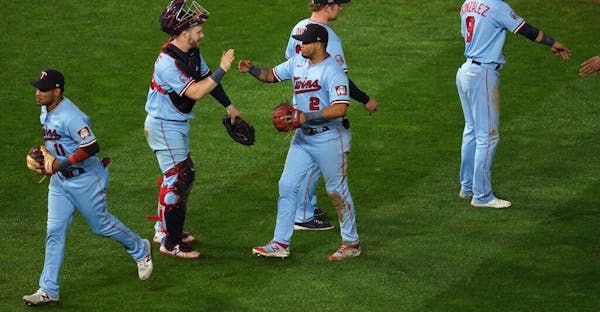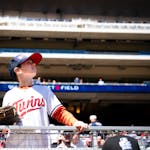CHICAGO – Major league players reached an agreement with the league a week ago about allowing families to accompany them inside the quarantined playoff bubble. But that deal left out some people, Rich Hill pointed out this weekend: families of non-playing staff members who, like the players, won't be able to go home while the Twins are still alive in the postseason.
"From the training staff to the equipment managers to [public-relations staff] to bat boys — everybody should be given this opportunity," said Hill, a veteran of five postseasons. "We're swinging and missing, big time. … I know how important it is to have family around, to enjoy these big moments with your family, and I do not agree with not allowing the staff to have their family be part of this."
Derek Falvey, president of baseball operations, said he's hopeful that the restrictions, which will preclude his own family from joining him, may change as the games go on.
"The impetus for this was to start off the playoffs in a manner that tried to keep as tight a bubble as possible initially. In the short term, yes, those are the rules," Falvey said. "But moving forward from there on, should we progress to the Division Series and [League Championship Series] and otherwise, there will be some conversation to be had at the league level."
Meanwhile, the Twins have remained remarkably infection-free without a strict quarantine. With one week remaining in the regular season, no Twins player has tested positive for the coronavirus. But that doesn't mean Falvey doesn't get a little anxious every time, three times a week, a new batch of test results arrives.
"No chance. I would say there is no point at which I will not be anxious about what those results look like," Falvey said, pointing out that infections can occur no matter how strictly they follow protocols. "Our guys have been great all year. They're really vigilant. But anything can happen."
Lights please
Josh Donaldson had a career .133 average (4-for-30) at Wrigley Field entering Sunday, and even that's up from the .083 he carried into this series. It's not an excuse, Donaldson said, but he believes he knows part of the problem: With no lights in the outfield, this is a dark ballpark that takes some getting used to.
"It's different, not having any lights in the background at all," said Donaldson, who saw well enough to hit his first Wrigley home run on Saturday. "In talking to guys, even on the Cubs, they have difficulties as well. I don't know how it's even allowed, to be honest with you. I mean, it seems quite dangerous."
The lack of lights is accentuated these days by the lack of fans, he pointed out, so the dark green bleachers, many of which are covered by dark green tarps, and the black windows in the hitters' background only adds to the darkness. It's been that way since the Cubs became the last team to add lights in 1988, though few players have complained about the 106-year-old park.
"He could be right [about] that, absolutely," Twins manager Rocco Balbelli said. "When you're out there and you look to the outfield, it is dark. But it's just darker than what we're used to," considering that most MLB stadiums are lit up like TV studios.
Etc.
• Luis Arraez should return this week, with the Twins hoping the tendinitis in his left knee has ebbed during his 10 days on the injured list. Just to be sure, the second baseman spent the weekend playing seven-inning games in St. Paul. "We'll be able to make a good judgment, as far as physically how he's doing," Baldelli said. "He hasn't had any sort of setbacks. He says he feels good. We're going to find out by letting him show us."
• Speaking of minor knee problems, Nelson Cruz sat out for a second night in a row in order to make sure his sore right knee gets no worse. "He's been dealing with it on and off for a few days," Baldelli said. "We just got to the point where we're not going to wait any longer to take action on it."






